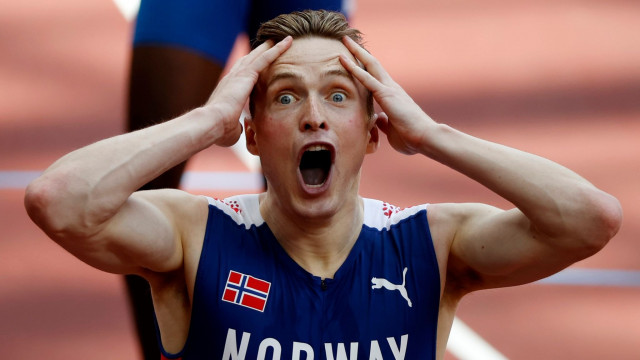Five great Olympic athletics moments
Karsten Warholm's victory in the men's 400 metres will go down in history as one of the greatest races of all time

Karsten Warholm's victory in the men's 400 metres hurdles final at the Tokyo Olympics, smashing his own world record by a huge margin into the bargain, will go down in history as one of the greatest races of all time.
Sydney McLaughlin of the USA repeated the world record feat in the women's event a day later.
AFP Sport picks out five other memorable athletics moments from the Olympics over the years:
Usain Bolt's astonishing gold medal winning performances in the 100m and 200m at the 2008 Beijing Games -- setting world records in both -- took male sprinting onto another plane.
His 9.69sec in the 100m could have been even quicker had he not slowed down and slapped his chest in celebration close to the line. He also had an untied shoe lace.
"That was Bolt though, right?" four-time sprint Olympic medallist Ato Boldon told Olympics.com.
"His top is not tucked in to his shorts, (his) shoes are untied and he takes the last third of the race off."
There was no such repeat in the 200m as Bolt broke the American Michael Johnson's 12-year-old record, posting a mark of 19.30sec.
"A lot of people compare me to Michael Johnson," Bolt said at the time.
"But I don't like to compare myself to other people because I just try to be me.
"Michael Johnson was a great athlete. He revolutionized the sport, I just changed it a little bit."
Florence Griffith Joyner, or 'Flo Jo' as she was commonly known, was the glamorous queen of the sprints at the drug-tainted 1988 Seoul Olympics.
While the winner of the men's 100m, Ben Johnson, was being sent home in disgrace after testing positive for steroids, the American sprinter was winning both the women's 100m and 200m in equally jaw-dropping fashion.
Her 200m victory was the most astonishing.
She emerged from the bend clear and even though Jamaican Grace Jackson came with a late run, Griffith Joyner pulled further and further ahead to set a new world record of 21.34sec that still stands today.
Many, including former training partners, queried her performances -- she would retire from the sport the following year -- but unlike Johnson she never tested positive.
Her records remain but in 1998 she died, aged only 38.
"It would be good for me to win gold, so we can have gold and silver in our family . . . so I can tell him, 'I am better than you.'" David Rudisha was referring to the 4x400m relay medal his father had won at the 1968 Mexico City Olympics. At the 2012 London Games, the Kenyan did just that in a remarkable manner, leading from starting gun to finish line in the 800m and obliterating the world record with a time of 1min 40.91sec.
It has been labelled by many as the greatest two-lap race of all time.
The then 23-year-old took great pride that his victory was watched in the stadium by previous world record holder and the 2012 Games' chief organiser, Sebastian Coe.
"He had the balls to go in there and think 'I am so much better than anyone else'," said Coe.
"In Olympic finals you are not supposed to gamble with the till but he did."
Ethiopian Abebe Bikila lined up shoeless for the marathon at the 1960 Rome Olympics as a pair of running shoes he had bought after his fell apart had given him blisters.
Although it took place in the late afternoon it was still 23 degrees Celsius (73.4 degrees Fahrenheit), but by the 16-mile mark, just Bikila and Morocco's Mehdi Ben Abdessalam were battling it out for gold.
Bikila prevailed after finding a little extra in the tank to move clear of his valiant rival with just 500 metres to go, crossing the line in a new world record of 2hr 15min 16.2sec to become the first east African to win Olympic marathon gold.
"I wanted the world to know that my country Ethiopia has always won with determination and heroism," said Bikila, who went on to defend his title in 1964.
Nawal El Moutawakel's win in the women's 400 metres hurdles at the 1984 Los Angeles Games was a landmark. As she told AFP in 2019, it had taken just 54 seconds to go from the "dark to the light" when she became the first Muslim woman from Africa to win Olympic gold.
El Moutawakel, whose victory in Los Angeles was marked by the then King Hassan II ordering every girl born that day named in her honour, said the hurdles on the track reflected the challenges she had faced in her life.
However, she always met them head on, claiming "my victory meant no more just washing the dishes for women".



















COMMENTS
Comments are moderated and generally will be posted if they are on-topic and not abusive.
For more information, please see our Comments FAQ